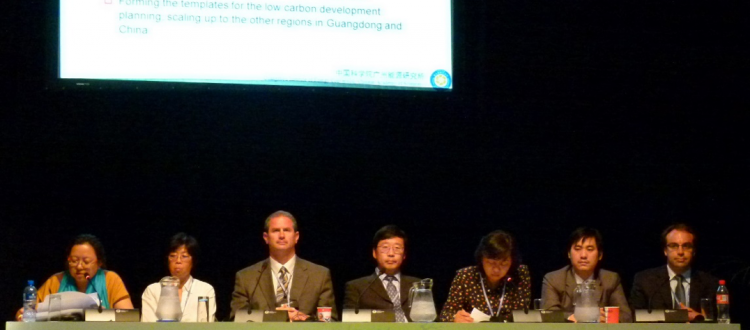GEI’s COP 17 Side Event: Chinese & US NGOs’ Bilateral Climate Efforts
DURBAN (Dec. 8, 2011) –Global Environmental Institute (GEI) together with the U.S.-based think tank, Center for Climate Strategies (CCS), hosted a side event titled “China-U.S. Eco-Partnership for US-China Subnational Planning” during the United Nations Framework Convention on Climate Change (UNFCCC)’s 17th Conference of the Parties (COP17) in Durban, South Africa.
The side event included a description of GEI and CCS EcoPartnership program, which will promote science-based policy making for low-carbon development, and solicited the feedback of many esteemed experts.

GEI’s Mme Jin Jiaman (second from right) and CCS’ Tom Peterson (third from right) sit on the panel – GEI 2012
Expert Feedback at the Side Event
Jin Jiaman, Executive Director of GEI emphasized that the partnership between GEI and CCS aims to promote substantial cooperative actions between the U.S. states and Chinese provinces on climate and energy issues because she believes that the cooperation between U.S. and China will help accelerate global efforts to combat climate change.
Dr. Wang, Yi, Deputy Director of the Institute of Policy and Management at Chinese Academy of Sciences (CASIPM), also emphasized the important role of international cooperation in China’s low carbon development. Dr. Wang pointed out the potential areas for US-China cooperation, such as low carbon development models, low carbon technologies, climate policies (e.g. carbon financing), etc. He also noted that low carbon development has to integrate multi-elements, such as technologies, market and policies, and the international cooperation at different sectors (e.g. government, business, research institutes) will speed up the exploration process for a low carbon development model adapted to China’s local context.
Dr. Zhao, Daiqing, Deputy Director of Guangzhou Institute of Energy Conversion at CAS (CASGIEC), introduced the methodologies used for low carbon planning in Guangdong province. She valued the importance of cost-benefit analysis and macroeconomic assessment of new climate policies, data transparency and availability, and engagement of multi-stakeholders for low carbon planning in Guangdong Province.
Billy Leung, Vice President of US-based Regional Economic Modeling Inc. (REMI), introduced their economic planning model, its major advantages, application areas (energy, transportation, etc.) and major clients (government, business, research institute and NGOs).
During the introduction of the Chinese version of the REMI model, which is being developed by REMI, GEI and CASIPM together, Mr. Leung emphasized that the model would be able to forecast both short-term and long-term impact of policies on individual industries, national/regional economy, employment rate, inter-industry trade, return on investment, etc, which can assist decision makers in choosing the best low carbon policy for both environmental and economic benefits.
Advantages of GEI and CCS’ EcoPartnership
GEI’s Executive Director, Ms. Jin, and the President of CCS, Mr. Thomas Peterson, introduced the collaboration between GEI and CCS in the field of climate change since 2009, and the Eco-Partnership program they newly joined in April, 2011 under the US-China Ten Year Framework for Cooperation on Energy and the Environment.
In his presentation of “thinking globally, acting locally”, Mr. Peterson shared how climate action plans on state-level helped US states achieve the goals of greenhouse gas (GHG) emission reduction, clean energy development, employment increase and economic growth.
The GEI-CCS joint project has already been in action to help China in the development of provincial low carbon planning methodologies. The Guangdong Province and Chongqing Municipality have been chosen as pilot regions. The project is expected to expand to 5 provinces and cities in the next 2-3 years. The methodologies developed through the program will assist local governments in achieving economic development goals while reducing energy consumption and GHG emission.

